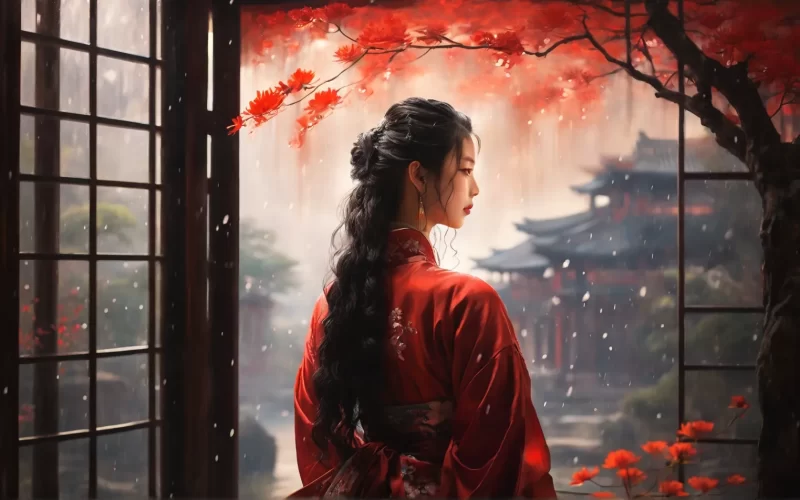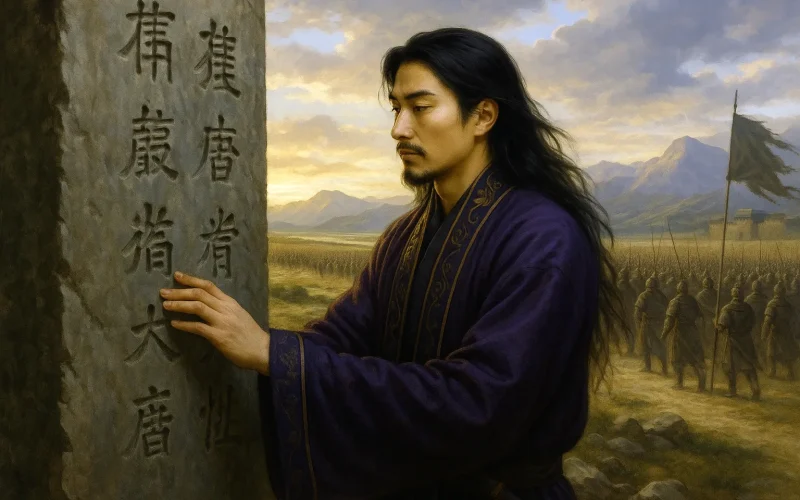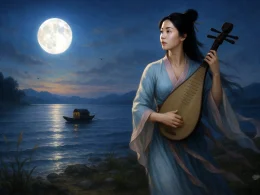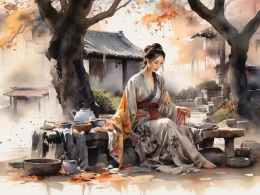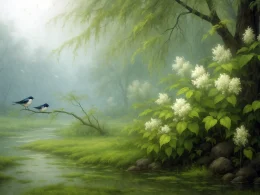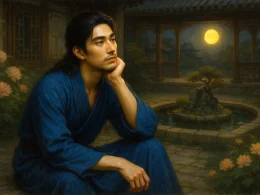A faint phoenix-tail gauze, fragrant and doubled,
Lines your green canopy, closed for the night…
Will your shy face peer round a moon-shaped fan,
And your voice be heard hushing the rattle of my carriage?
It is quiet and quiet where your gold lamp dies,
How far can a pomegranate-blossom whisper?
…I will tether my horse to a river willow
And wait for the will of the southwest wind.
Original Poem
「无题 · 凤尾香罗薄几重」
李商隐
凤尾香罗薄几重,碧文圆顶夜深缝。
扇裁月魄羞难掩,车走雷声语未通。
曾是寂寥金烬暗,断无消息石榴红。
斑骓只系垂杨岸,何处西南待好风?
Interpretation
This poem is one of the most exquisitely structured and emotionally nuanced works within Li Shangyin's "Untitled" series, composed during his middle period, approximately 850-855 AD. This era was defined by a stark dichotomy: domestic happiness (his deep bond with his wife, née Wang) stood in sharp contrast to political disillusionment. Consequently, the romantic expressions in his poetry from this time are profoundly infused with metaphors for life's unpredictable fortunes.
While on the surface depicting an unfulfilled romance, this poem continues Li Shangyin's "Untitled" tradition of fusing personal sentiment with lofty intent. The focused waiting implied in "sewing the canopy," the missed moment of the "carriage like thunder," the long vigil of "gilt ashes growing dark," and the faint hope in "awaiting a favorable wind" together form a complete inner landscape of anticipation and loss. By this stage, Li Shangyin's poetic craft had reached a state of consummate mastery, allowing him to expand a fleeting moment into a timeless tableau and elevate a specific romantic circumstance into a reflection on a universal human condition.
First Couplet: 凤尾香罗薄几重,碧文圆顶夜深缝。
Fèng wěi xiāng luó báo jǐ chóng, bì wén yuán dǐng yè shēn féng.
Layer upon layer, sheer silk with phoenix-tail design;
The rounded canopy with azure patterns, I stitch late into the night.
Explication: The poem opens with an exceedingly meticulous description of an object, quietly containing multiple depths of meaning. "I stitch late into the night" depicts not merely an action but suggests a state of concentrated, solitary anticipation. The luxurious imagery of "phoenix-tail silk" and "azure-patterned canopy" creates a subtle tension with the lonely hour of "late night," establishing the poem's foundational tone of solitary longing permeating scenes of beauty.
Second Couplet: 扇裁月魄羞难掩,车走雷声语未通。
Shàn cái yuè pò xiū nán yǎn, chē zǒu léi shēng yǔ wèi tōng.
My fan, cut like the moon, could not hide my flustered face;
Your carriage rumbled past like thunder—no chance to speak, no word to trace.
Explication: This couplet employs a technique akin to cinematic montage to crystallize an eternal moment of missed connection. "My fan, cut like the moon" captures a glimpse of the woman's bashful beauty, a visual revelation; "your carriage rumbled past like thunder" renders the brutal interruption of a real opportunity, an auditory regret. The poignant contrast between "could not hide my flustered face" and "no chance to speak" underscores a cruel reality: inner emotion had surfaced, yet external communication was severed by circumstance. This instant of failed connection becomes the source of perpetual yearning.
Third Couplet: 曾是寂寥金烬暗,断无消息石榴红。
Céng shì jìliáo jīn jìn àn, duàn wú xiāoxī shíliú hóng.
So many desolate nights, watching golden embers fade to dark;
No word at all, while pomegranate blossoms blaze and fall apart.
Explication: The poet conveys the despair of waiting through two distinct measures of time. "Watching golden embers fade" counts time in nights, a microscopic, repetitive anguish; "pomegranate blossoms blaze" marks the yearly turn of seasons, a macroscopic, relentless passage. The definitive declaration "no word at all" confirms the prolonged experience of "so many desolate nights," portraying waiting as a futility gradually hollowed out by time itself.
Final Couplet: 斑骓只系垂杨岸,何处西南待好风?
Bān zhuī zhǐ xì chuí yáng àn, hé chù xīnán dài hǎo fēng?
My dappled steed remains tethered by the willow-shaded shore.
Where, facing the southwest, can I await that wind, that welcome, once more?
Explication: The poem concludes with an image of spatial suspension and irresolution. "My dappled steed remains tethered" implies a state of constant readiness without direction; "the willow-shaded shore," the site of an appointed meeting, has become an empty symbol. The question "Where… can I await…" subtly adapts an allusion from Cao Zhi's poetry ("I long to be the southwest wind") and, more significantly, reveals a deep-seated anxiety about seeking elusive possibility within a fixed structure—the very direction from which to expect hope has been lost.
Holistic Appreciation
This is a poetic meditation on the "paradox of waiting," articulated through time and space. Four meticulously chosen scenes—sewing late at night, the chance encounter, the vigil for news, the tethered horse awaiting wind—sketch an emotional structure of perpetual preparation forever ending in missed connection. Li Shangyin's profundity lies in exposing the inherent tragedy of waiting: the more focused the anticipation, the greater the risk of missing the true encounter; the stronger the attachment to a promise, the deeper the entrapment in an empty locale.
The poem exhibits perfect formal symmetry and circularity: the first couplet's "stitching the canopy" (static, interior waiting) echoes the final couplet's "tethered steed" (dynamic, exterior waiting); the second couplet's "no chance to speak" (failed communication) intensifies into the third's "no word at all" (complete cessation of contact). This structure suggests that waiting itself has become a self-contained system—every action (sewing, watching, tethering) reinforces the state of anticipation rather than leading to its fulfillment.
Particularly masterful is how each image carries a dual temporality: the "phoenix-tail silk" is both the present object of labor and the future site of reunion; the "pomegranate blossoms" mark both natural cycles and the passage of youth; the "favorable wind" is both a literary hope and a slim chance in reality. This layering of temporal dimensions grants the poem historical resonance and philosophical weight within its concise form.
Artistic Merits
- Juxtaposition of "Exquisite" and "Desolate" Imagery: Opulent images—phoenix-tail silk, moon-cut fan, pomegranate blossoms—are set against desolate contexts: deep night, solitude, dying embers, the absence of news. This forms Li Shangyin's distinctive aesthetic of "resplendent desolation."
- Strategic Use and Absence of Sensory Detail: The poem richly engages sight (patterns, fan), sound (carriage rumble), and touch (sheer silk), while emphasizing the utter absence of verbal exchange ("no chance to speak"). This sensory composition heightens the pain of separation across a short distance.
- Precise Architecture of Spatio-temporal Imagery: Moving from the interior "late-night stitching" to the street-side "thunderous carriage," from the nightly "darkening embers" to the seasonal "pomegranate blossoms," and finally to the locational "willow-shaded shore" and directional "southwest wind," the poem constructs a multi-dimensional framework of time and space, making the act of waiting a tangible presence within them.
Insights
The poem reveals an existential dilemma still relevant today: in an era of constant connection, do we still experience an essential kind of "missing"? The conversation shattered by a "carriage like thunder" in Li Shangyin's verse might now manifest as dialogue fragmented by information overload; the prolonged vigil of "watching embers fade" might parallel our anxiety when refreshing a screen brings no reply.
The image of the "tethered steed" serves as a profound metaphor for the modern emotional state: we are perpetually ready for engagement (constantly connected, emotionally available), yet often lack a clear direction (adrift in choices, uncertain of meaning). The plaintive "Where… can I await that wind?" translates to a contemporary question: in the age of algorithmic suggestion, how do we await a genuine "favorable wind"—not a data-calculated match, but a true resonance of spirit?
Ultimately, the poem prompts us to reconsider the value of "waiting." When waiting may prove eternally fruitless ("no word at all"), can the act itself still constitute a meaningful stance? Li Shangyin's answer is implicit in the attentiveness of "stitching late" and the quiet hope of "awaiting a wind"—perhaps significance lies not in what is awaited, but in maintaining, through anticipation, a posture of life that remains open to grace. This posture may be the final, and most poetic, defense against emptiness.
Poem translator
Kiang Kanghu
About the poet
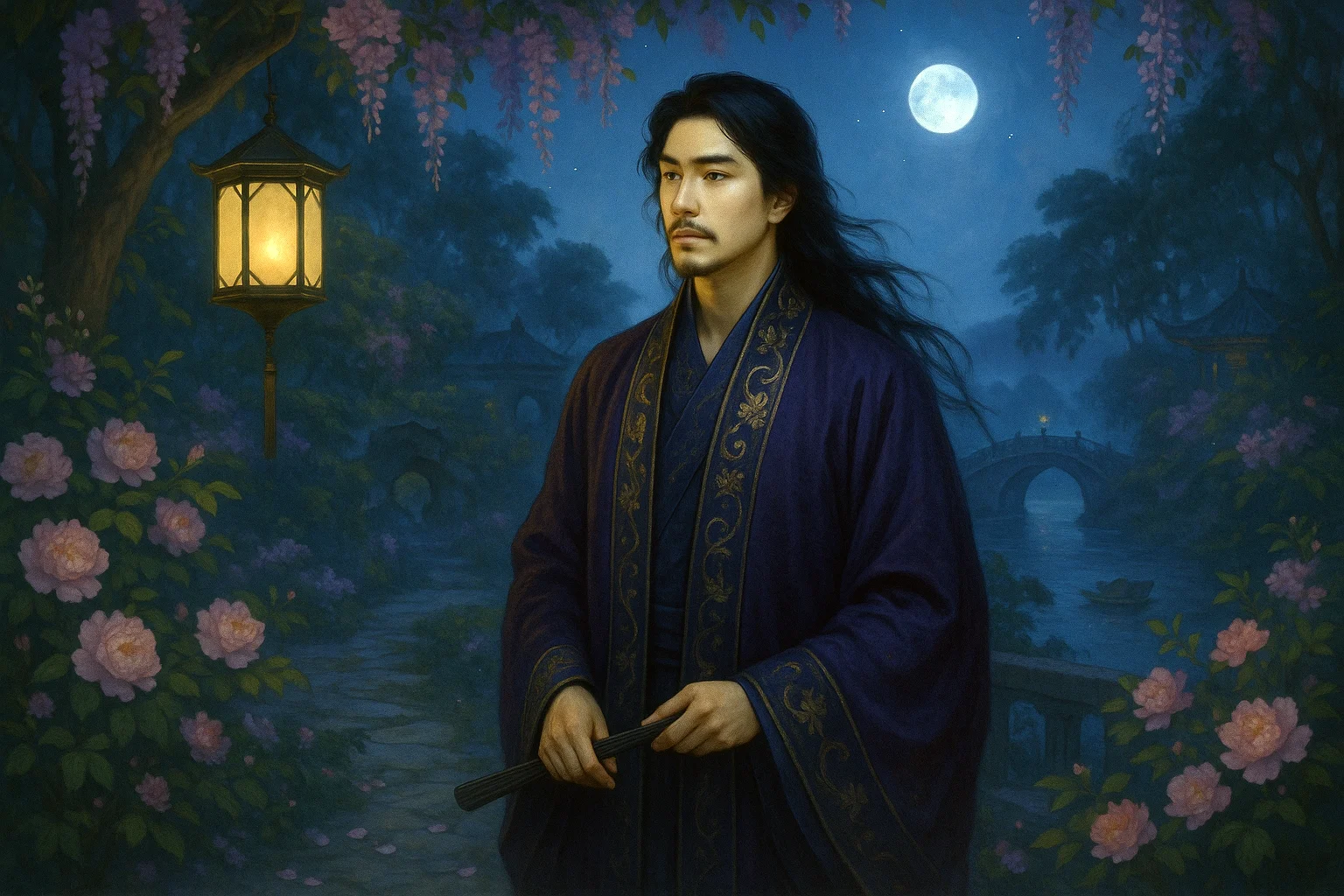
Li Shangyin (李商隐), 813 - 858 AD, was a great poet of the late Tang Dynasty. His poems were on a par with those of Du Mu, and he was known as "Little Li Du". Li Shangyin was a native of Qinyang, Jiaozuo City, Henan Province. When he was a teenager, he lost his father at the age of nine, and was called "Zheshui East and West, half a century of wandering".







